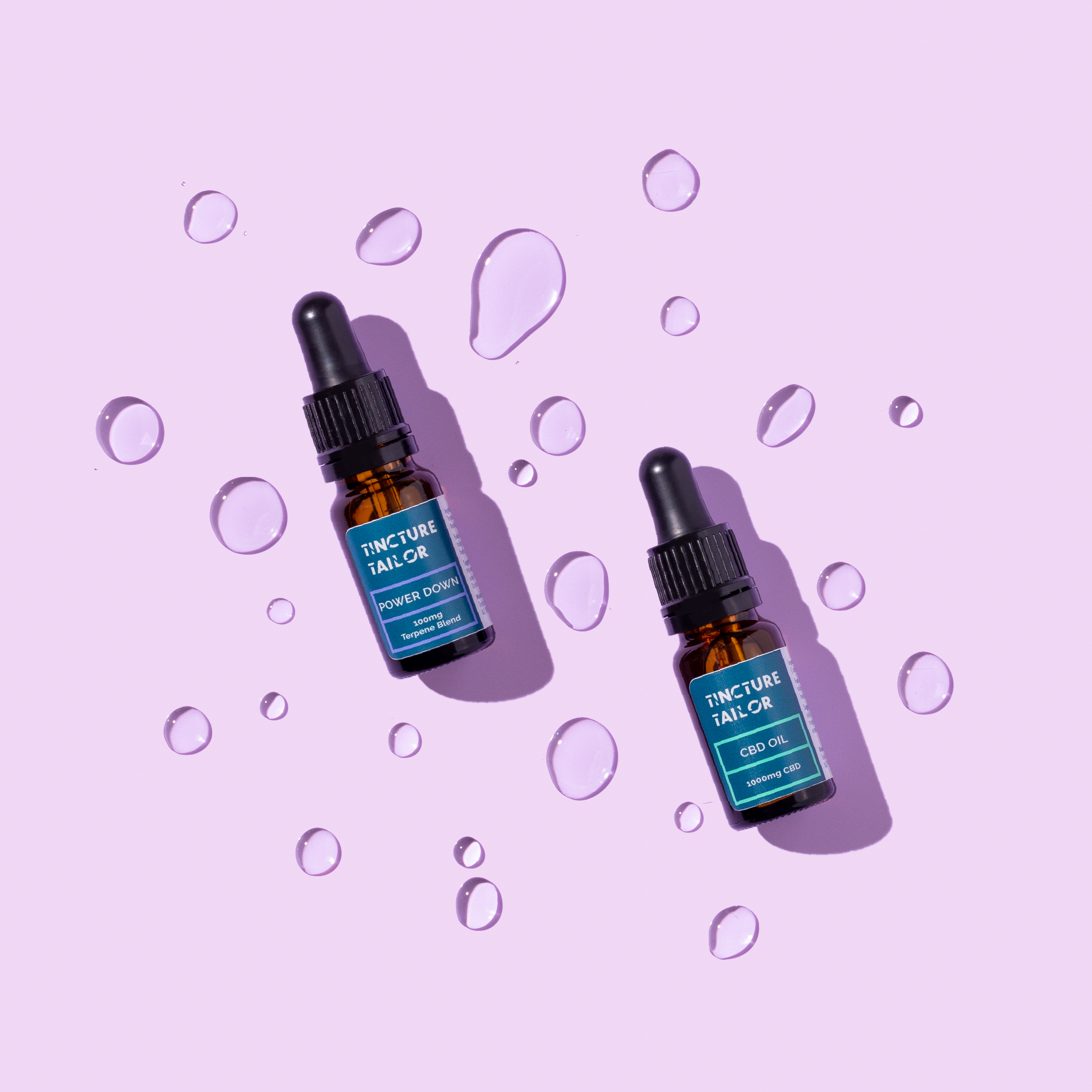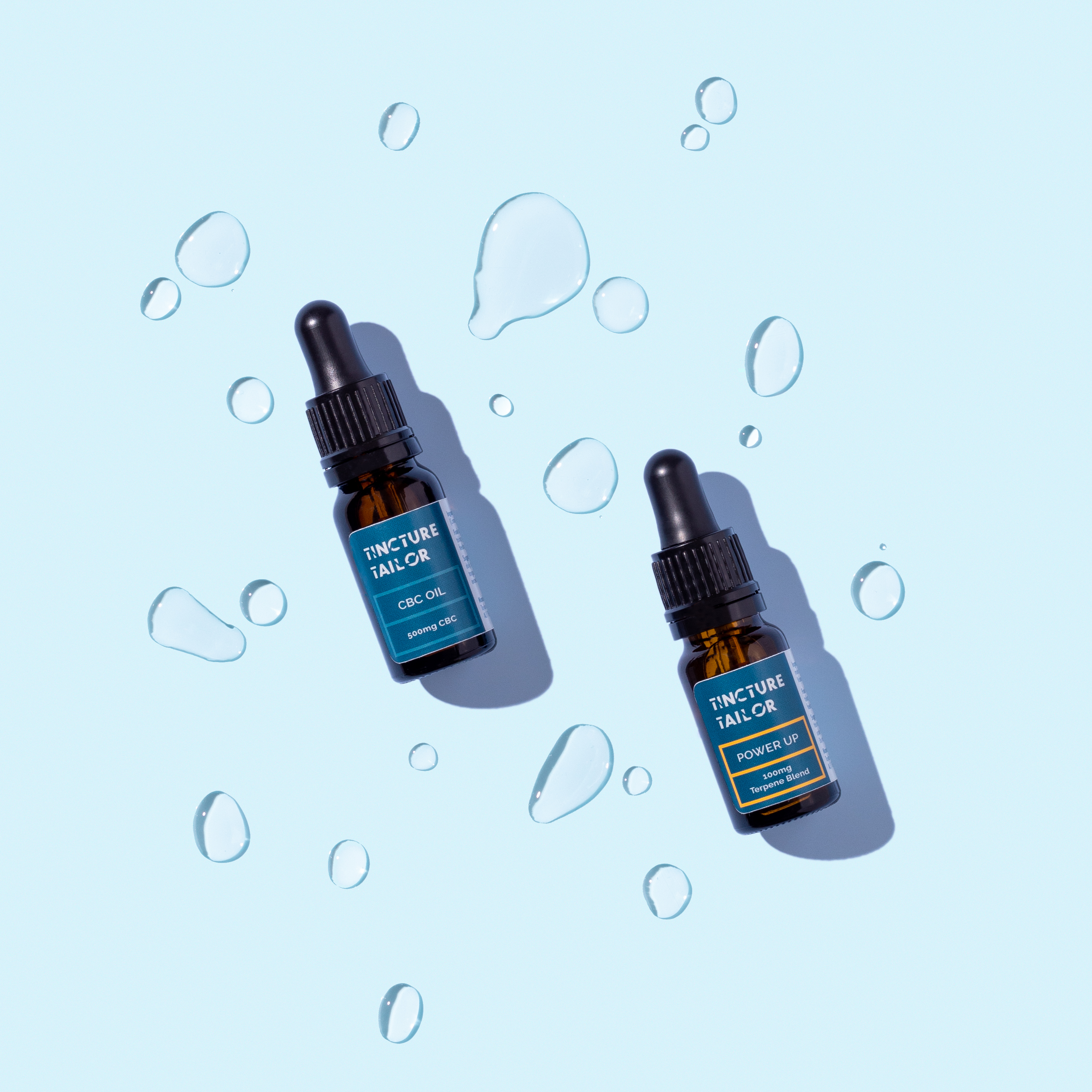Sarah Sinclair, Cannabis health expert and writer explores how Tincture Tailor’s brand new – Find Your Zen package can improve your sleep and help you bounce out of bed super restored and well rested (I know, imagine right?!)
- Acts as a mild sedative inducing sleep
- Reduces stress hormones & boosts feelings of calm
- Relaxes muscles and helps you drift off into a deeper sleep
The Find Your Zen range has been specifically designed to support you in those moments where you need a little calm. Whether that’s to quieten racing thoughts and help you drift off at the end of the day, or to encourage you to take a deep breath, tap into your inner peace and move more harmoniously through challenging situations.
The package combines the Tincture Tailor 10% CBD oil – a powerful cannabinoid which through interacting with the body’s serotonin receptors is known to help regulate pain, sleep and mood – with the brand’s potent Power Down Blend, bringing together a range of terpenes designed to promote calm, relaxation, stress resilience and restful sleep.
Both products have been thoughtfully selected due to their natural potential for boosting feelings of calm, reducing stress hormones in the body and, ultimately, help you find your zen.
The need for better sleep
If you’re reading this thinking the above sounds like something you need more of, you’re not alone. Struggling to fall asleep or lying awake in the middle of the night is a feeling many of us know all too well – with up to a third of Brits suffering from insomnia or sleep related issues at some point in our lives. Despite Sleep Foundation guidelinesadvising that healthy adults should aim for between seven and nine hours of sleep a night, most of us only manage an average of six. The problem has become so prevalent that the NHS now has its own acronym for those who report feeling ‘tired all the time’ (TATT).
Then there’s the pandemic and all of the knock on worldly stresses that seem to be escalating week by week. While life may have returned to some sense of normality, many of us are still feeling the effects of the on-going anxiety and/or grief we’ve been living with throwing our sleep schedules off-balance.
Sleep is critical to human health and wellbeing, giving your body and mind time to rest, replenish and recover ready for the next day. While you sleep your body goes through different stages, all of which are important to successful rest. Not getting enough can increase the likelihood of a number of health problems from short term ones such as fatigue and lack of concentration, to chronic issues such as depression or diabetes.
So how can cannabinoids help?
Anecdotal evidence and a growing body of scientific research suggest that cannabis, and even CBD alone, can help relieve symptoms of insomnia and improve sleep quality. CBD directly interacts with the endocannabinoid system (ECS) which is responsible for maintaining homeostasis – or balance – in the body, binding with CB1 receptors which are found throughout the central nervous system. Through this interaction it can have a beneficial effect on inflammation, mood stability and sleep. [1] [2]
A few drops of CBD can also ease anxiety or stress, as a result helping you to feel more relaxed. Our bodies naturally produce the chemical anandamide, often referred to as the ‘bliss molecule’ due to its mood enhancing properties. Anandamide is a fragile molecule that can be broken down easily by the body, but CBD is thought to potentially slow down this process, leaving you feeling calmer. [3]
A study from 2019 examined if CBD could improve sleep and/or reduce anxiety. Participants were given a capsule containing 25mg of CBD daily and in the first month, 79% reported lower anxiety levels and 67% said they slept better. [4]
What about terpenes?
Terpenes are naturally occurring compounds found in cannabis, but also many other plants which contribute to their aroma and taste. They all have their own therapeutic properties which if harnessed can enhance our health and wellbeing. In particular, terpenes such as linalool, pinene and myrcene are thought to help with insomnia or poor quality sleep.
Linalool
Linalool is the naturally occurring terpene found in lavender and is thought to share many similar benefits to those of CBD, including potentially easing anxiety, depression and sleep issues. It has been used for centuries in traditional medicine as a sedative and muscle relaxer, partly due to its ability to increase levels of adenosine, a sedating hormone that can help us to fall asleep and relieve pain. [5]
One study reported that linalool could potentially help to reduce sleep problems in dementia patients. Participants found they slept for longer on the days where they inhaled lavender containing the terpene, than when they did not. [6]
Myrcene
The terpene myrcene, which can be found in hops, lemongrass and thyme, as well as the flowers of the cannabis plant, has also previously been associated with sleep. Like linalool, it has a long history of use as a sleep aid in herbal medicines, with some studies showing it can act as sedative and muscle-relaxant. [7]
Nerolidol
Nerolidol, found in neroli, ginger, jasmine, lavender, tea tree and Cannabis sativa, also has potentially sedating and anti-anxiety effects. One study found it is the terpene most associated with cannabis strains rated high for reducing anxiety. [8]
Bisabolol
This terpene, extracted from German chamomile, is often found in herbal teas, where it is said to have relaxing effects. [9] A 2017 study suggested that bisabolol may impact gamma-aminobutyric acid (GABA) receptors in the brain, which can induce relaxation and reduce anxious feelings and behaviour. [10]
How to use the Find Your Zen range
While we are still finding out more about how these natural compounds can work to promote health and wellbeing, they can be a powerful tool to have in your quest to maintain sleep hygiene. Use them alongside your regular routine, such as having a warm bath before bed, going to bed at the same time every night, not looking at screens two hours before and avoiding caffeine or high sugar foods after 4pm.
It is never one-size fits all when it comes to cannabis. Tincture Tailor is all about finding the right products to suit your individual needs. Start by taking a few drops of each tincture around an hour before you go to bed, gradually increasing your dose according to your body and your desired effects. You should always speak to your doctor before making any changes to your medical care.
ENDS (1,009)
References
1 – Barrie, N., & Manolios, N. (2017). The endocannabinoid system in pain and inflammation: Its relevance to rheumatic disease. European journal of rheumatology, 4(3), 210–218. https://doi.org/10.5152/eurjrheum.2017.17025
2 – Kesner AJ and Lovinger DM (2020) Cannabinoids, Endocannabinoids and Sleep. Front. Mol. Neurosci. 13:125. doi: 10.3389/fnmol.2020.00125
3 – Leweke, F. M., Piomelli, D., Pahlisch, F., Muhl, D., Gerth, C. W., Hoyer, C., Klosterkötter, J., Hellmich, M., & Koethe, D. (2012). Cannabidiol enhances anandamide signaling and alleviates psychotic symptoms of schizophrenia. Translational psychiatry, 2(3), e94. https://doi.org/10.1038/tp.2012.15
4 – Shannon, S., Lewis, N., Lee, H., & Hughes, S. (2019). Cannabidiol in Anxiety and Sleep: A Large Case Series. The Permanente journal, 23, 18–041. https://doi.org/10.7812/TPP/18-041
5 – Peana, A. T., Rubattu, P., Piga, G. G., Fumagalli, S., Boatto, G., Pippia, P., & De Montis, M. G. (2006). Involvement of adenosine A1 and A2A receptors in (-)-linalool-induced antinociception. Life sciences, 78(21), 2471–2474. https://doi.org/10.1016/j.lfs.2005.10.025
6 – Takeda, A., Watanuki, E., & Koyama, S. (2017). Effects of Inhalation Aromatherapy on Symptoms of Sleep Disturbance in the Elderly with Dementia. Evidence-based complementary and alternative medicine : eCAM, 2017, 1902807. https://doi.org/10.1155/2017/1902807
7 – do Vale, T. G., Furtado, E. C., Santos, J. G., Jr, & Viana, G. S. (2002). Central effects of citral, myrcene and limonene, constituents of essential oil chemotypes from Lippia alba (Mill.) n.e. Brown. Phytomedicine : international journal of phytotherapy and phytopharmacology, 9(8), 709–714. https://doi.org/10.1078/094471102321621304
8 – Kamal BS, Kamal F and Lantela DE (2018) Cannabis and the Anxiety of Fragmentation—A Systems Approach for Finding an Anxiolytic Cannabis Chemotype. Front. Neurosci. 12:730. doi: 10.3389/fnins.2018.00730
9 – Muñoz-Pérez, V. M., Ortiz, M. I., Ponce-Monter, H. A., Monter-Pérez, V., & Barragán-Ramírez, G. (2018). Anti-inflammatory and utero-relaxant effect of α-bisabolol on the pregnant human uterus. The Korean journal of physiology & pharmacology : official journal of the Korean Physiological Society and the Korean Society of Pharmacology, 22(4), 391–398. https://doi.org/10.4196/kjpp.2018.22.4.391
10 – Tabari, M. A., & Tehrani, M. (2017). Evidence for the involvement of the GABAergic, but not serotonergic transmission in the anxiolytic-like effect of bisabolol in the mouse elevated plus maze. Naunyn-Schmiedeberg’s archives of pharmacology, 390(10), 1041–1046. https://doi.org/10.1007/s00210-017-1405-0






